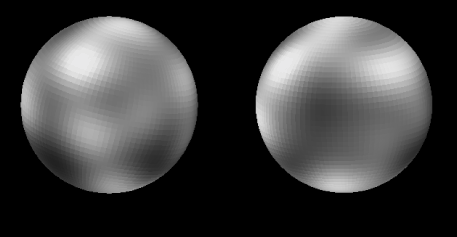
|
Explanation: No spacecraft from Earth has yet explored Pluto but astronomers have found ways of mapping its surface. A stunning map of this distant, diminutive planet, the first based on direct images, was revealed late last week in a Hubble Space Telescope press release. Above are two opposite hemisphere views of the computer constructed map of Pluto's surface (north is up). The grid pattern is due to the computer technique used where each grid element is over 100 miles across. The map is based on Hubble images made when Pluto was a mere 3 billion miles distant. It shows strong brightness variations - confirming and substantially improving upon ground based observations. While the brightness variations may be due to surface features like craters and basins they are more likely caused by regions of nitrogen and methane frost. The frost regions should show "seasonal" changes which can be tracked in future Hubble observations. Yes, Pluto is a planet even though it is only 2/3 the size of Earth's Moon!
Information:
The
Scale of the Universe Debate in April 1996
|
January February March April May June July August September October November December |
| ||||||||||||||||||||||||||||||||||||||||||||||||
NASA Web Site Statements, Warnings, and Disclaimers
NASA Official: Jay Norris. Specific rights apply.
A service of: LHEA at NASA / GSFC
& Michigan Tech. U.
Based on Astronomy Picture
Of the Day
Publications with keywords: Pluto - HST
Publications with words: Pluto - HST
See also:
